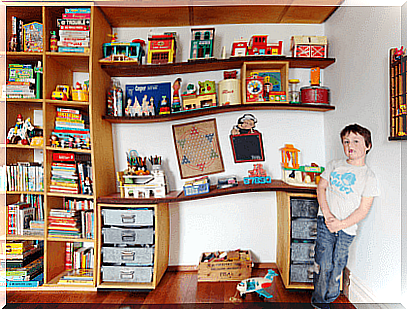How To Teach Children To Value What They Have?

If during our childhood we have suffered from certain shortcomings, it is normal to wish that our children do not have to suffer for the same reason. And so, sometimes we make the mistake of giving them too many gifts, “so they don’t want for anything”. Still, it is important to help them understand the transience of material objects, and the value that everything we have has compared to what we desire.
It can happen to pass through a shop, buy a wonderful toy, take it home full of enthusiasm (because, let’s face it, we parents are happier than our own children to see their surprised expression!) And that they do not give the slightest importance to the gift.
They continue to concentrate on what they were doing before, probably playing games on their cell phones or computers or watching television. And this can make us disappointed at first. It can even make us sad, because we had to work hard to buy them that toy, which they didn’t know how to value.
Of course, they have a bedroom full of toys, of which they don’t even use half, and therefore it is difficult for them to pay attention to something new or to feel grateful for our gesture. It is up to us, as adults, to teach them to recognize sacrifices and to ensure that they earn what they receive.
This does not mean that they have to work from an early age, but that they must learn that in life nothing rains from the sky, and that to get what you want you always have to make an effort. This may sound like a strong statement for an elementary school child, but if we can internalize this concept, we will be doing them a great favor.
We often do not realize that our children are receiving everything without paying attention to where things come from, without being aware of how much effort we went to earn that money, how we got it, etc.
And, even if our economic conditions are good, we don’t have to get them used to having everything they want. We never know which turns life will take, and if our economic condition will be positive also in the future. So, how can we make a child understand that there are times when, however much you want, you cannot buy a new toy, a video game or a latest generation mobile phone?

Teach children to value what they have
To make the little ones realize the value of things (not in terms of money, but in terms of effort and priority, for example) and help them not to become machines that consume and require something new every day, it is Well:
– Give them homework. From the age of three, the child can already participate in some housework and have some responsibilities, however small. Of course, we will not start by entrusting him with the task of arranging the dishes or cleaning the windows, but he can, for example, carry the clean clothes up to his bedroom.
Gradually we can entrust him with new tasks, adapted to his abilities. But beware: the best thing to reinforce this positive behavior is not material rewards, but positive words and social recognition, to make them feel proud of their work.
– Don’t buy them everything they ask for. The advertisements aimed at children on television are designed specifically to generate new desires in children. In fact, toys are presented as wonderful tools for having fun. If you want to give them a gift that matches one of their wishes, it’s best to wait a bit and don’t buy it right away when they ask for it.
Take some time to think about it, make sure it is something they really want and not a whim due to the fact that they have seen that toy on TV just before or because a classmate has it. Don’t try to show them your affection with gifts, but do it as a good parent should do: by giving them time and love.
– Establish a budget. When the children are a little older and can understand what money and prices are, you can talk to them about the cost of some of the things they ask for. Allow them to help you manage your money, and if you get the chance (and if they deserve it!), You can give them periodic allowance to get them used to managing their own limited resources.
Finally, do not fall into the mistake of thinking “my children will never miss anything”, because neither money nor gifts will buy their happiness and their love. Remember that “where there is something too much, there is something missing. And what is left over cannot replace what is missing ”.







